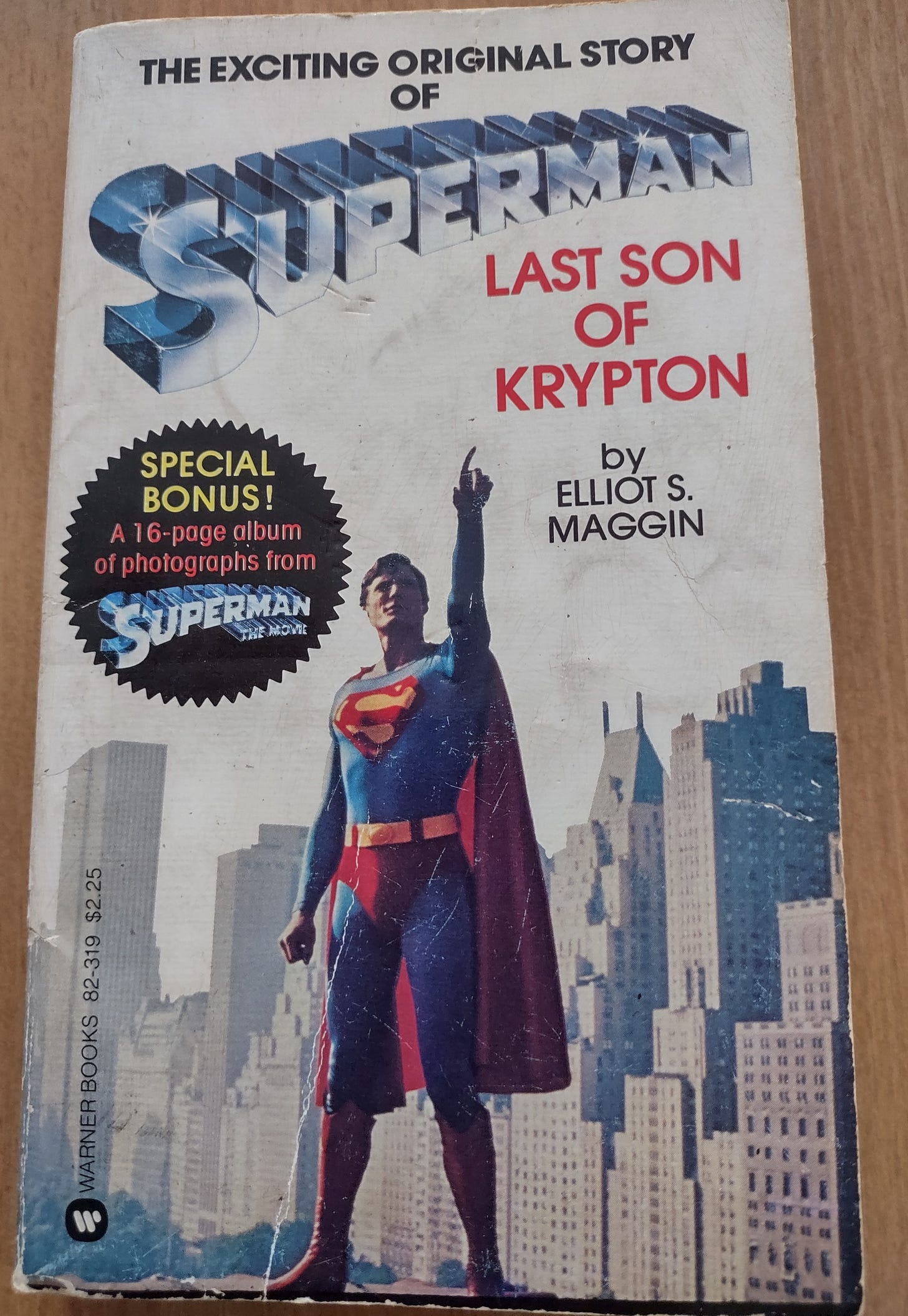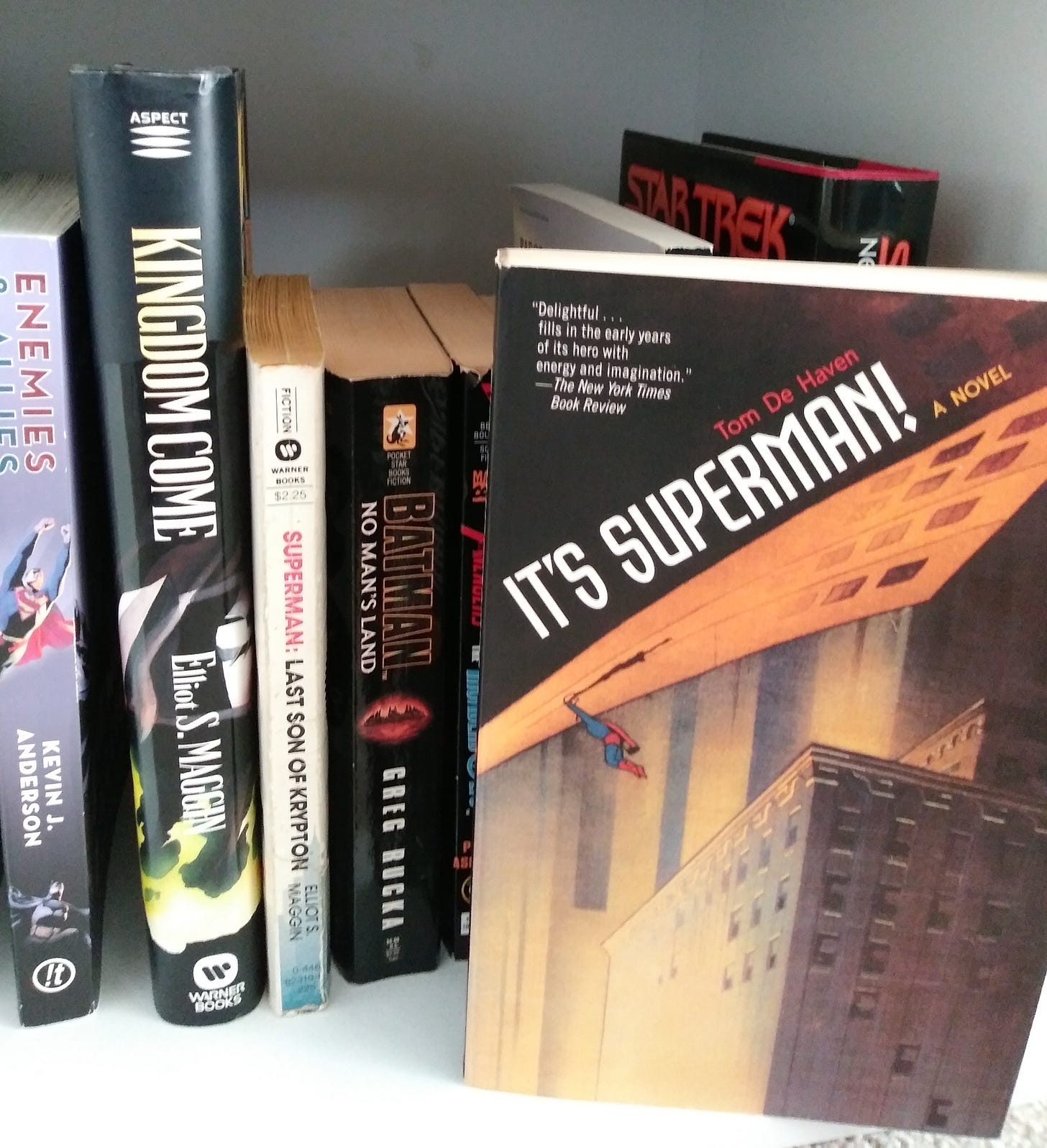Superman in Prose
The Man of Steel soars in novels too.
Superman has many powers. Among them is his ability to translate into virtually any medium. Comics are his birthplace and the most natural fit, but he’s done pretty well for himself in movies, cartoons, live-action TV, even radio way back when, and also novels.
Last year, I reread two Superman prose novels that had been sitting on my bookshelf for quite some time. It had probably been at least fifteen years since I looked at either one, and I’m pleased to report that both remain enjoyable reads. These books give us two very different interpretations of the character, and yet both feel very much like Superman.
Superman: Last Son of Krypton by Elliot S. Maggin is a fun, quick read. Even though it’s got Christopher Reeve on the cover and movie photos inside, it’s based on 1970s Superman comics, not the movie series.
This Clark Kent has moved on from the Daily Planet and is a TV reporter. This Superman has extra powers, including super-memory and the ever-useful super-ventriloquism. This Lex Luthor spent some of his childhood in Smallville and knew young Clark and Superboy (and lost his hair in a lab accident, because in old-school comics, even something as commonplace as baldness requires a special origin story).
The book’s cast also includes the Guardians from Green Lantern—and none other than Albert Einstein himself, who’s retconned into Superman’s origin story (which is unnecessary generally but works for the book).
Maggin’s novel reads like a fleshed-out version of a ’70s comic book, and he plays it straight, as though the strange, colorful world of old Superman comics is the most natural thing ever. It’s nice to find such a superhero story without any self-aware, self-deprecating meta humor. Instead, we just have Superman being Superman, with a very well-written Lex Luthor threatening to steal the show.
Maggin had a second Superman novel, Miracle Monday, which I’ve never read, but now I’m curious.
It’s Superman! by Tom De Haven is, in part, Superman as historical fiction, placing the character in his original 1930s setting. Though I liked it the first time around, I figured I’d appreciate it more now, having read several nonfiction books about the period since then.
And I did, and not just for the historical detail.
The parts in Smallville feel like a cross between a Superman story and a John Steinbeck novel, which gradually transitions into old-school sci-fi, with a lower-powered, more vulnerable Superman battling robots.
This Clark Kent is young and awkward, feeling like the alien he is as he tries to figure out his place in the world. The novel repeatedly makes the point that while Clark isn’t stupid by any means, he’s not especially intelligent either.
That seemed to diminish him at first, but it does enhance the awkwardness and uncertainty the author is going for. This Superman hasn’t developed his confidence yet, and giving him a normal mind allows the character to retain plenty of vulnerability.
One criticism I keep seeing about Superman is that he’s too powerful—if nothing can hurt him, then why should we care? This overlooks the fact that there are many ways to hurt a character, and not all of them are physical. Plus, the aspirational appeal of Superman is that you’ve got this guy who can do virtually whatever he wants with his life … and he still chooses to help people.
Lex Luthor, by contrast, is highly intelligent and supremely confident, and he uses his skills for his own personal gain. While Clark tries to find his place among humanity, Lex prefers to distinguish himself from all of humanity.
Compare this description of Clark: “Finding people who are like him, even in the smallest ways, is always a comfort. It’s stupid, he knows, but it’s always some comfort.”
And this line of dialogue from Lex: “ ‘I don’t discriminate, Carl. All human beings are the same to me.’ ”
There have been various takes on Superman over the past 80+ years. In some (like Maggin’s novel above), he’s Superman first and foremost while Clark Kent is little more than a disguise. In others, he’s Clark Kent first and foremost while Superman is simply the way he chooses to use his gifts to serve the world. I prefer the latter approach, which is what It’s Superman! takes.
This novel would fit in well in DC’s Elseworlds line. It should not be seen as the definitive take on the character. But as a way of fleshing out the version that appeared in Action Comics #1 in 1938 and giving that Superman a detailed backstory, it’s excellent.
I’m sure there are other good Superman novels out there—please let me know if you’ve read any!
I write superhero novels. Click the button below to take a look (and thank you to everyone who already has!).



